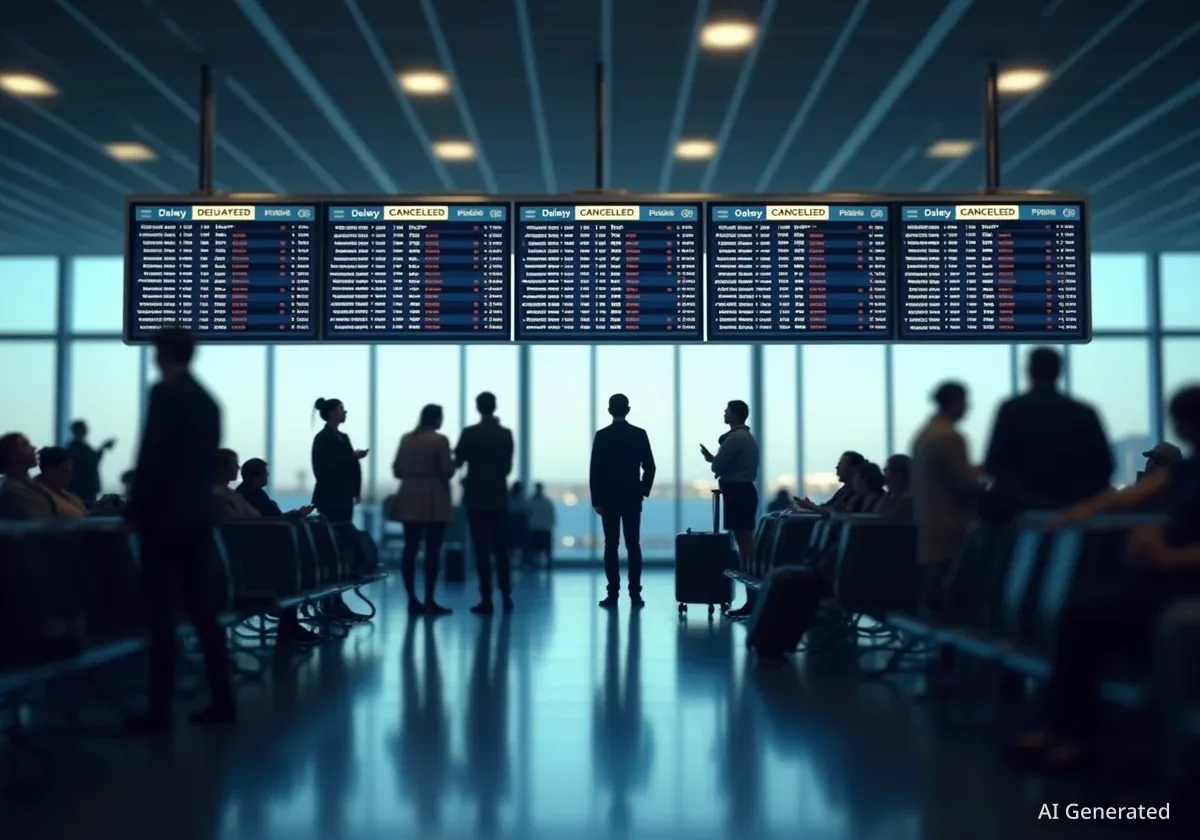The Federal Aviation Administration (FAA) issued a ground stop for both Dallas/Fort Worth International (DFW) and Dallas Love Field Airports on Tuesday. This action was taken due to a reported telephone outage, which effectively halted both departing and inbound flights. The FAA stated that the issue stemmed from local telephone company equipment and did not involve FAA systems.
Travelers experienced significant disruptions across North Texas airports. The FAA worked with the telephone company to identify and resolve the cause of the communication breakdown. This incident underscores the critical role of reliable infrastructure in maintaining air travel operations.
Key Takeaways
- FAA issued ground stops for DFW and Dallas Love Field.
- The cause was a local telephone company equipment issue, not FAA equipment.
- Hundreds of flights were delayed or canceled at both airports.
- The ground stops were initially set until 5 p.m. local time.
Understanding the Ground Stop
A ground stop is a measure implemented by the FAA to prevent flights destined for a specific airport or region from taking off. This advisory remains in effect until the FAA lifts it, ensuring that airports do not become overcrowded or unsafe during operational disruptions. In this instance, the ground stop applied to all flights heading towards North Texas.
According to the FAA's website, the ground stops were initially scheduled to last until 5 p.m. local time. The agency also indicated a 30% to 60% probability that these ground stops could be extended beyond the initial timeframe. This uncertainty added to the challenges faced by passengers and airlines.
Quick Fact
A ground stop is different from a ground delay. A ground stop prevents departures to a specific airport, while a ground delay program manages traffic volume into an airport by assigning departure slots.
Impact on Flight Operations
The immediate impact of the ground stops was evident in flight data. As of 3 p.m. on the day of the incident, FlightAware data showed substantial disruptions. DFW Airport reported 570 delays and 66 cancellations. Dallas Love Field experienced 196 delays and 1 cancellation during the same period.
These figures highlight the significant inconvenience for thousands of travelers. Airlines had to adjust their schedules, leading to a ripple effect across their networks. Passengers were advised to check their flight status frequently and contact their airlines for the latest information.
"The FAA is slowing flights at Dallas Love Field and Dallas-Fort Worth International Airport due to a reported local telephone company equipment issue that does not involve FAA equipment," the agency stated in a release to The Dallas Morning News. "The FAA is working with the telephone company to determine the cause."
Major Airlines Affected
Both DFW International and Dallas Love Field are major hubs for prominent airlines. Dallas Love Field is predominantly served by Southwest Airlines, which operates out of 18 of the airport’s 20 gates. This means a significant portion of Southwest's operations were directly impacted by the ground stop.
DFW International Airport serves as a mega-hub for Fort Worth-based American Airlines. As one of the busiest airports in the world, any disruption at DFW affects a vast number of domestic and international flights. The ground stop at DFW therefore had a broader reach, affecting American Airlines' extensive network.
Background on Dallas Airports
DFW International Airport is one of the world's busiest airports, serving millions of passengers annually and acting as a primary hub for American Airlines. Dallas Love Field, while smaller, is a key focus city for Southwest Airlines, providing extensive domestic connectivity.
Passenger Advice and Future Outlook
During such events, passengers are typically advised to stay updated through official airline channels and airport websites. Airlines often provide options for rebooking or refunds, depending on the severity and duration of the disruption. Communication is key for travelers to manage their plans effectively.
Incidents like these emphasize the vulnerability of modern air travel to infrastructure failures. While the FAA quickly identified the source of the problem as a local telephone company issue, the widespread effects demonstrate how interconnected various systems are in supporting aviation. Efforts to enhance resilience in communication networks are ongoing within the aviation industry to minimize future disruptions.
- Check airline apps for real-time flight status.
- Contact airlines directly for rebooking options.
- Monitor airport websites for official updates.
The FAA and the telephone company continue to investigate the root cause of the equipment issue to prevent similar occurrences. Ensuring the reliability of all components, both directly and indirectly linked to air traffic control, remains a top priority for aviation safety and operational efficiency.





